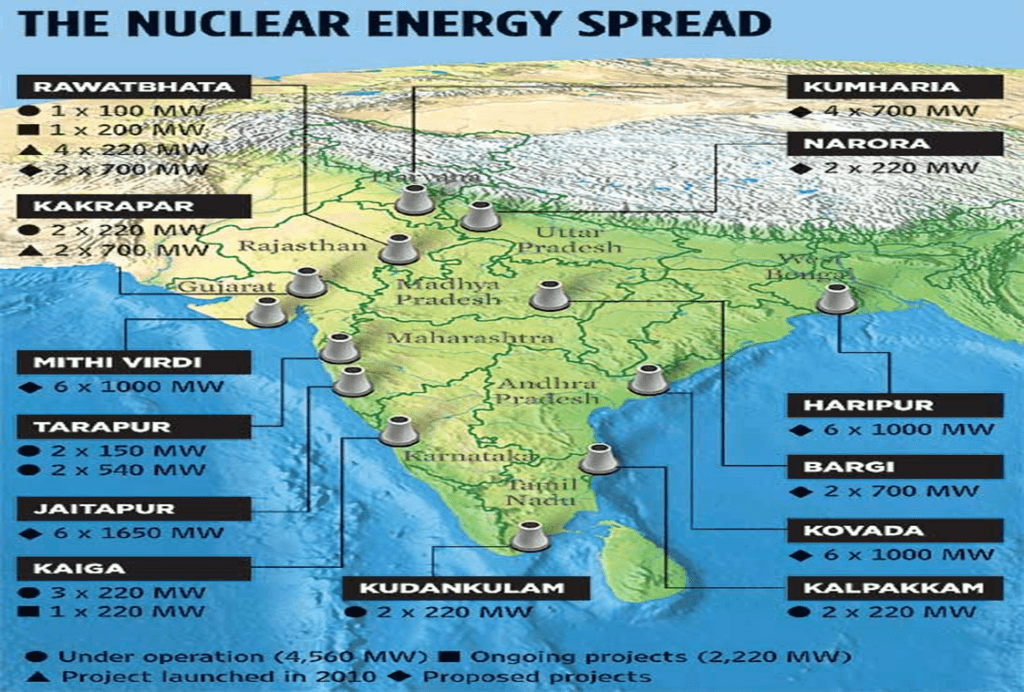The Jaitapur Nuclear Power Plant (JNPP) is a project between India and France to build six nuclear power plants in Ratnagiri, with a combined capacity of 9,900 MW. However, the project has faced issues due to India’s Civil Liability for Nuclear Damage Act. In a recent development, the French company Electricite de France (EDF) has stated that nuclear liability issues for the Jaitapur project have not been resolved.
Importance of Jaitapur Nuclear Power Plant for India
Nuclear power is a clean and environment-friendly source of energy that can help ensure India’s long-term energy security on a sustainable basis. The Jaitapur project will also strengthen the partnership between India and France and create thousands of local jobs in Maharashtra. Once completed, it will provide electricity to seven crore households.
Issues with Jaitapur Nuclear Power Plant
The main issue with the Jaitapur project is India’s Civil Liability for Nuclear Damage Act, which foreign companies consider excessive. Under the act, foreign companies could be liable to pay hundreds of millions of dollars in the event of a nuclear accident. This has made international manufacturers reluctant to begin any nuclear project in India. Although India has ratified the international convention on nuclear energy accident liability, foreign companies still view the domestic liability law as a barrier to investment.
Suggestions and the Way Forward
To address the issue of civil nuclear liability, India has taken steps in the past. The government released a list of FAQs on “Civil Nuclear Liability” in February 2015 and launched the India Nuclear Insurance Pool (INIP) in June that year. The INIP is an insurance pool that covers the equipment suppliers’ risk of potential liability.
To enhance the generation from nuclear power plants in the country, the government has given administrative approval and financial sanction for ten indigenous 700 MW Pressurized Heavy Water Reactors (PHWRs) to be set up in fleet mode with the provision of equity support. The government also needs to resolve the issues related to the Civil Liability for Nuclear Damage (CLND) Act and create the Indian Nuclear Insurance Pool (INIP).
In addition, the government should consider amending the Atomic Energy Act to enable joint ventures of public sector companies to set up nuclear power projects. This would help attract more foreign investment in the nuclear sector and enhance India’s energy security in the long run.

Why In News
In recent news, Electricite de France (EDF), the French company involved in the Jaitapur Nuclear Power Plant project, has raised concerns about the unresolved nuclear liability issues surrounding the project. This has brought attention to the challenges that India faces in attracting foreign investment in the nuclear energy sector due to its Civil Liability for Nuclear Damage Act.
MCQs about Jaitapur Nuclear Power Plant
-
What is the Jaitapur Nuclear Power Plant (JNPP)?
A. A nuclear power plant being constructed in India with French cooperation.
B. A nuclear power plant being constructed in France with Indian cooperation.
C. A nuclear power plant being constructed in Japan with Indian cooperation.
D. A nuclear power plant being constructed in India with American cooperation.
-
What is the issue that the French company EDF has with the Jaitapur Nuclear Power Plant project?
A. Nuclear liability issues
B. Technical issues
C. Financial issues
D. Environmental issues
-
What is the purpose of the India Nuclear Insurance Pool (INIP)?
A. To cover the equipment suppliers’ risk of potential liability
B. To provide insurance for the employees of nuclear power plants
C. To cover the government’s cost of building nuclear power plants
D. To compensate the affected people in case of a nuclear accident
Boost up your confidence by appearing our Weekly Current Affairs Multiple Choice Questions
![]()


